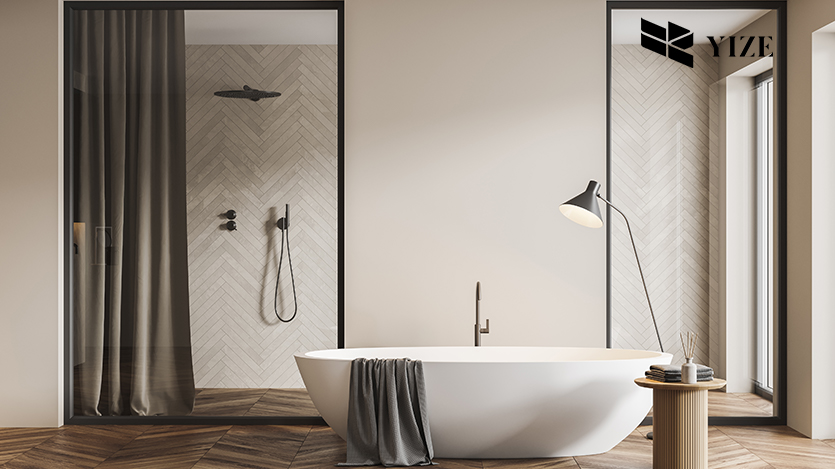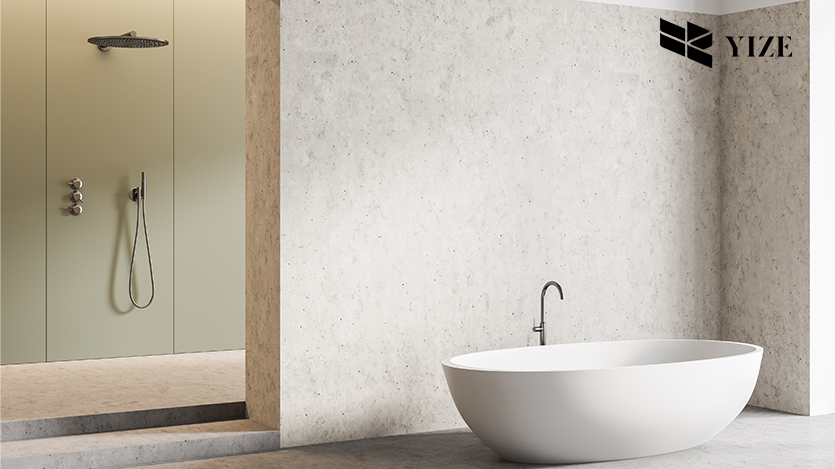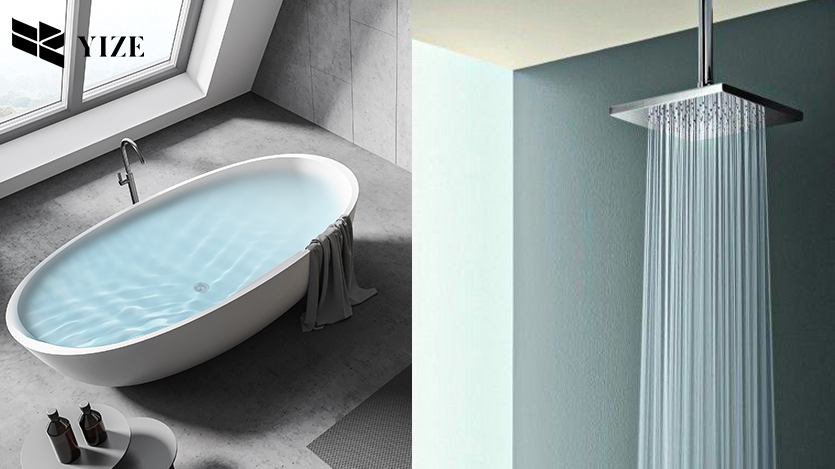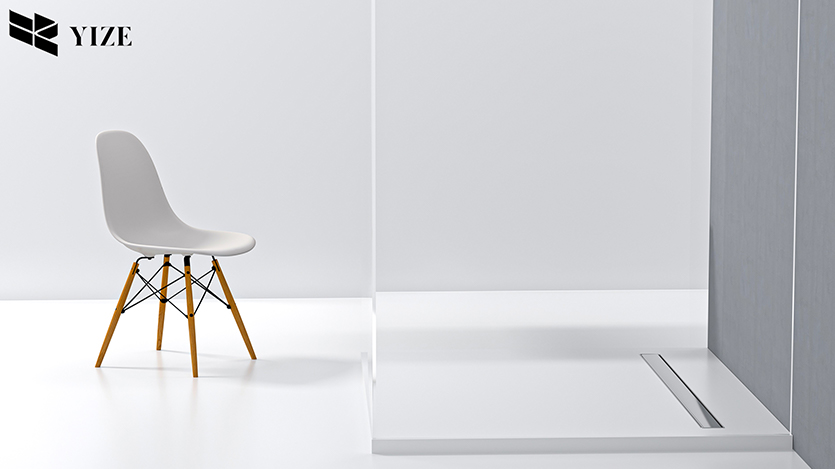One of the most important decisions you’ll make is whether to install a separate shower room or a bathtub. Your choice will affect the look and layout of your bathroom and your expenses. With that said, how do you know which one to pick?
We’ve written a complete guide detailing everything you need to know to come to a decision. To learn more, continue on below.
Shower Room vs Bathtub: An Overview
For a more detailed analysis of the shower room vs bathtub debate, continue to the next section. If you’re looking for a quick overview, we’ve got you covered here.

- Separate Shower Room
Pros:
- Takes up less floor space
- Uses less water
- Uses less electricity from the water heater
Cons:
- Difficult to bathe kids and pets
- Harder to fix leaks
- Bathtub
Pros:
- Better for relaxation
- Better for bathing kids and pets
Cons:
- Uses more floor space
- Uses more water
- Longer waiting and preparation time (to fill up)
What Are the Similarities Between a Shower Room and a Bathtub?
The decision between installing a bathtub or a separate shower room becomes more difficult due to the similarities:
- Various Styles. Both shower rooms and bathtubs come in a variety of styles for you to choose from.
- Different Materials. You’ll find separate shower rooms and bathtubs made of different materials.
What Are the Differences Between a Shower Room and a Bathtub?
- Installation
The size of your bathtub or shower room will impact the difficulty of the installation. Depending on how big your bathroom is, you may need to move your sink and toilet to make space for the new fixtures.
Installing standard bathtubs and standard shower rooms involves similar processes. Once you’ve sorted out the plumbing, you’d repair and strengthen the flooring. The drain plumbing is then connected.
The installation of a separate customized shower room will be more involved. You’ll need the skills of a tile craftsman, a carpenter, and a plumber.

With a pre-fabricated shower room, the installation process will be much more streamlined. A pre-fabricated shower will be even easier for you to install than a standard tub.
- Health
When it comes to health, the first thing you need to know is that showers are cleaner than baths. If your priority is finding the best way to clean your entire body, you should build a separate shower room.

Showers are more effective than baths because they remove contaminated water. When you’re taking a shower, water mixes with the soap on your body to remove dirt stuck to your skin. When you take a bath, water also rinses away dirt. But the contaminated water stays with you in the tub.
Bathtubs also come with benefits when it comes to health:
- Muscle Relaxation. Baths are fantastic for stimulating your nervous system and relaxing your muscles. A study in 2018 found that those who took daily warm baths experienced less stress and fatigue.
- Skin Soothing. Certain types of baths relieve symptoms of skin illnesses.
- If you have a cold or the flu, a warm bath with water over your chest may help. Taking a bath while you’re sick can help you break a fever, relax sore muscles, and relieve nasal congestion.
As with baths, showers also come with a wide range of benefits in relation to health. For example, hot showers generate warmth and steam. The steam helps your body release toxins.
Additionally, there are other health-related benefits you’d gain from taking a shower:
- Immune System Boost. Showering – especially with cold water – has the potential to boost your immune system. Taking a shower with water that gets colder results in a stronger immune system.
- Glowing Skin and Hair. Showers have the power to improve circulation under your skin. This increased circulation may stimulate blood flow near your scalp. When this happens, the way your hair and skin look will improve.
- Depression Treatment. Cold showers may help treat depression. You were to start your shower at a warm temperature and then turn down the temperature as we mentioned. Then the temperature change would stimulate your nervous system. Also, it would promote the production of endorphins in your body. These endorphins may help reduce depression symptoms.
- Environment
On this planet, we have limited resources; those resources aren’t distributed. Some countries may have plenty of water, while others don’t. If you care for the planet, how much water your bathtub or shower room will use will affect your decision.

Some people argue that bathtubs are more eco-friendly than showers. They say that in a bath, you control how much water you use, and you don’t waste any water. Other people claim that a shower can be better for the environment (as long as you don’t take too long).
When it comes to figuring out which option is better for the planet, there’s no clear answer. There are many things you could consider. It is such as water usage, the size of a tub, and how long your shower water is running. Also, how much electricity your water heater uses?
If you run the math, you’ll find that bathing in a bathtub can use about 30 to 58 gallons of water on average. A shower with a low-flow showerhead might only use 25 gallons every 10 minutes.
As you can see, when it comes to eco-friendliness, there’s no definitive better option. The Environmental Protection Agency (EPA) generally recommends that the best option for the environment is to take a quick shower. If your shower water is running for only ten minutes, you’re using much less water.
- Cost
The money that you’ll spend largely depends on how much water you’re using each month. Choosing a separate shower room instead of a bathtub will allow you to use less water (and spend less money). If you want to cut costs even more, consider the following tips:
- Get a Low-Flow Showerhead
Studies have found that low-flow showerheads are a worthy investment. Kennesaw State University changed all its showerheads and saw massive changes.
The university cut its overall water usage by nearly 30%. Objectively, they saved over 660,000 gallons of water and saved nearly $7,000 that year. Although the cost to install low-flow showerheads may be high, the investment pays off.
- Avoid Distractions
It’s easy to get distracted in the shower room because of how relaxing a long warm shower can be. But taking your time with the water running will increase your water bill. So, when you’re taking a shower, focus on showering. Don’t get lost in your daydreams.

- Have a Bucket for Cold Water
Many people may be guilty of letting the water run for several minutes before hopping in the shower. They do this because they want to avoid cold showers. But instead of letting water go down the drain, you may consider using a bucket. It is to catch whatever water isn’t warm enough for your shower. You can then use this extra water for watering your plants or for cooking.
- Use the Drain
If you’re curious to find out how much water you’re using in one sitting, plug the drain. By plugging the drain, you’ll see the water rise, and you’ll get a general idea of how much water (and money) you’re spending.
Frequently Asked Questions
Should You Get a Shower and Bath Combo?
A shower and bath combination is a space-saver that gives you the best of both worlds. Prices can vary depending on the style, features, and size of your combo. But a combination will likely provide you with fewer design options and sizes.
What Should You Consider When Deciding Between a Shower Room and a Bathtub?
Several factors will affect your decision. Depending on your situation and lifestyle, you might opt for a separate shower room or a bathtub. Note that while one may be better for you, the other may be better for a different person.
Think about what factors will affect your decision. Consider who are the people who’ll be using the bathroom. For example, if you’re having a baby soon, you may need a tub. If you’re worried about decreasing mobility, a shower room with a seat may be better.
Final Thoughts
A separate shower room would be the better choice for most people. But certain people may also enjoy a bathtub – such as people who have to give baths to little children.
Contact Us
Separate shower rooms are better than bathtubs in most aspects. If you’re set on getting a new separate shower room, you’ll need to consider what type of shower drain you’ll need. Luckily, Yize manufactures and sells high-quality bathroom accessories such as shower drains.

Yize prides itself on a significant presence in the sanitary ware industry. Aside from our years of experience in the industry, we provide the following services:
- We provide customized solutions to meet and exceed the expectations of our clients. We can customize several aspects such as material and color. They are to adhere to your requirements.
- Inspection of Product. We allow inspections to ensure you’re satisfied with our products.
Contact us today, and allow us to fulfill all your sanitary ware needs.
References
Is It Better to Take a Bath or a Shower? (2020, December 5). Healthline. https://www.healthline.com/health/bath-vs-shower
Larusso, C. E. (2022, August 15). Tub vs. Shower: Which Is Right for Your Bathroom? Angi. https://www.angi.com/articles/tub-vs-shower.htm
Reddigari, M. (2020, September 17). The Big Bathroom Remodeling Design Decision: Tub vs. Shower. Bob Vila. https://www.bobvila.com/articles/tub-vs-shower/
Shower vs Bath – Pros, Cons, Comparisons and Costs. (2017, March 28). Fixr.com. https://www.fixr.com/comparisons/shower-vs-bathtub
Smyth, D. (2022, March 4). What Are the Advantages of a Shower Vs. a Bathtub? Home Guides | SF Gate. https://homeguides.sfgate.com/advantages-shower-vs-bathtub-85788.html
Swann, A. (2022, January 14). Bath vs Shower: Which Option Is Better for the Environment? Brightly. https://brightly.eco/blog/bath-vs-shower-water-usage
